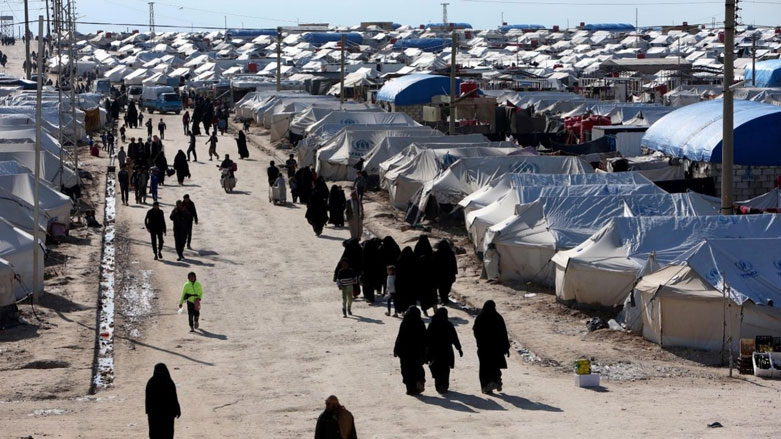First suspected coronavirus case in sprawling Syrian displacement camp

ERBIL (Kurdistan 24) – The first suspected coronavirus case has been identified in Syria’s infamous al-Hol Camp, a medical source confirmed to Kurdistan 24 on Saturday.
Dr. Sherwan Berry, Co-chair of the Kurdish Red Crescent (KRC), said, “There was one suspected case and we bring the sample and we are still waiting for the result.”
“Al-Hol Camp is very big and if it spreads, we cannot do anything. It’s very crowded and everybody there would get the disease,” Berry warned.
Thomas McClure, a Syria-based researcher at the Rojava Information Center, told Kurdistan 24, “We know now that there are some suspected coronavirus cases in al-Hol camp. But it is not confirmed now and tests are currently being carried out.”
“And if the tests are positive,” he added, “these cases will join the other four new cases in northeast Syria that have been confirmed until now following several months without any confirmed coronavirus.”
Although the region has until recently been free of known infections, the local Autonomous Administration of North and East of Syria (AANES) on Thursday confirmed four new coronavirus cases. This brings the total number of known COVID-19 cases to six. So far, only one person has died from the virus in northeast Syria.
“Medical authorities have been warning from the outset here that any outbreak of coronavirus in northeast Syria would be a disaster in the densely populated civilian areas full of IDPs (internally displaced persons),” McClure said.
However, he added that al-Hol has a “better provision of health services than in many of the other IDP camps across northeast Syria. Due to the fact that it is an internationally recognized camp, it receives significant external support, whereas many other camps housing Kurdish refugees are not recognized and receive little to no support from the UN or international organizations.
“As a result of the radicalization, particularly in the foreigners, any outbreak in al-Hol camp could be disastrous.”
A Facebook account entitled Aseera al-Hol that advocates for foreign women held at the camp claimed that the local market was closed on Saturday amid rumors of a suspected COVID-19 case among the population.
Al-Hol Camp was built to house 40,000 individuals but currently holds around 65,000, mostly women and children. This includes nearly 11,000 foreign women with alleged ties to the so-called Islamic State.
A UN report on Thursday also stated that the COVID-19 pandemic “highlighted the vulnerability of holding facilities and camps for internally displaced persons, particularly those in areas controlled by the Syrian Democratic Forces (SDF).”
One UN member state cited in the report said that poor nutrition, a shortage of medical supplies, and interruptions of the water supply were among the primary reasons for the likely spread of the virus throughout camps in the area if it spreads to those living within.
Turkey has regularly cut the water supply to northeast Syria by cutting off the Alouk water station, which has been under Turkish control since Ankara’s cross border invasion of the area in October 2019. UNICEF earlier warned that this could put at serious risk all current efforts to curb the spread of the coronavirus disease among vulnerable displaced populations.
Furthermore, due to repeated Russian and Chinese vetoes of UN Security Council resolutions, the al-Yarubiah border crossing was closed in January, shutting down crucial humanitarian aid to millions of civilians in northeast Syria, including 40 percent of all NGO medicine supplies.
In early July, Security Council members Germany and Belgium proposed the reopening of the border crossing in a draft resolution, but this demand was later removed due to Russian pressure.
Dr. Berry of the Kurdish Red Crescent told Kurdistan 24 that, although northeast Syria’s capacity to deal with such situations is gravely limited, local health officials are doing their best to prepare for the pandemic.
“We have already covered all the samples for people who need to be tested, contract-tracing is working well, and we are preparing emergency hospitals in Hasakah, Manbij and Tabqa.”
The KRC in April announced that it had created a 120-bed facility known as the COVID-19 Hospital in Hasakah, adding, “We did a lot of training and we are well-prepared, compared to other countries.”
Local authorities on Thursday announced new measures to prevent the potential spread of the virus, including closing border crossings, limiting travel, and prohibiting public gatherings such as weddings and other ceremonies.
Editing by John J. Catherine
